In mid-August 2024, I found myself in Muhanga, Rwanda, tasked with documenting the powerful stories of smallholder farmers. My mission? To highlight the resilience and innovation within these communities, with a particular focus on women, youth, and individuals with disabilities. This project, under Opportunity International’s "Inclusive Finance for Agricultural Value Chains in Rwanda" initiative, was about more than just photography. It was about transformation – capturing the impact of financial support on lives shaped by struggle.
I’ve undertaken similar work before but photographing these farmers as they improved their practices – whether using natural pesticides or incorporating digital technology – felt like a privilege. Their stories of overcoming challenges through access to loans, savings, and training mirrored parts of my own journey. Having grown up in an orphanage in Rwanda, I was once a recipient of similar support. Now, through my camera lens, I can give back by documenting stories that may help others.
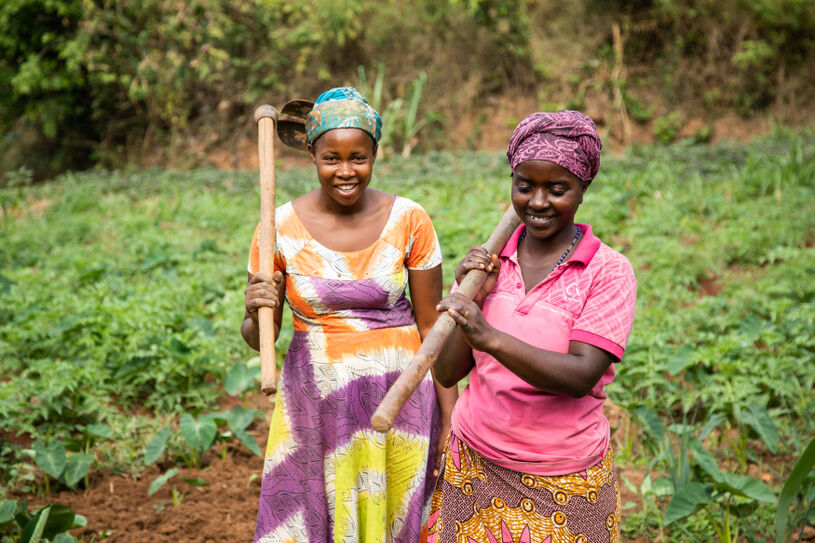
Alice, 29, and her friend Joselyne work together on the tomato plants at their farm.
The Emotional Impact
Photographing this type of work affects me deeply on a personal and emotional level, much more than other types of photography. When I'm capturing stories of people whose lives have been shaped by hardship or transformation – like women and children impacted by health challenges or poverty – I feel a profound sense of responsibility. These moments are raw, and they connect me to the resilience of the human spirit.
Compared to other subjects, this kind of work often leaves a lasting impact on me. It’s not just about taking a beautiful shot; it's about telling a story that can drive awareness and action. I feel emotionally invested because I know these images could help bring attention to important causes or raise funds for life-changing programmes. It’s a constant reminder of how powerful photography can be as a tool for change, and that motivates me to give my best in every frame.
On the flip side, it can also be emotionally exhausting. Being so close to suffering or resilience in difficult situations, you can't help but reflect on your own life and privileges. But ultimately, the reward is knowing that these images may lead to something positive, which gives my work a purpose beyond the camera.
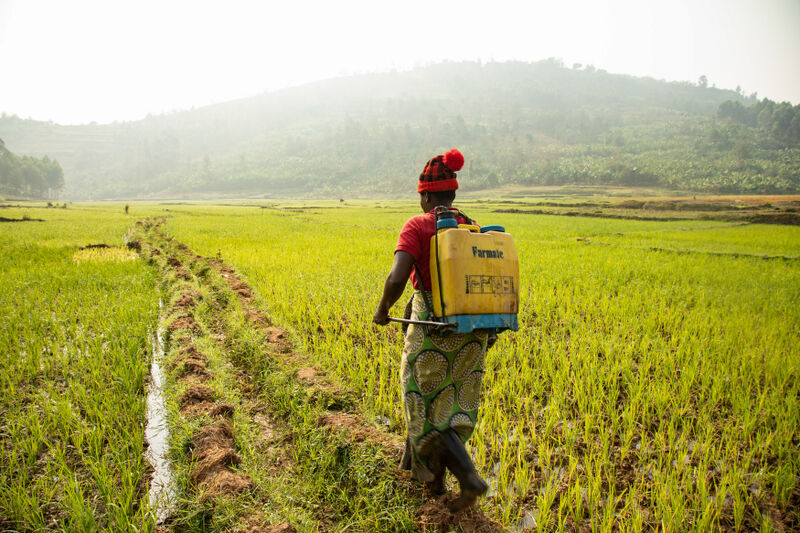
Jeanne D'Arc uses a spray tank on her rice farm, showing her commitment to effective farming practices.
Challenges and Lessons
The environment presented its own set of challenges. August is the dry season in Rwanda, and many crops weren’t thriving, limiting the visual impact of the images. The stark contrasts of high shadows and dry fields made it harder to show the progress these farmers had made. But through the lens, I saw something deeper – the resilience of people working against the odds. I adapted, focusing on the strength of the farmers rather than the environment itself, showing that even during difficult times, their determination shone through.
One of the most moving moments was meeting Mukamana Joselyne. At 44, she faces life as a widow with four children and a physical disability that once isolated her from her community. Yet through her vegetable farm and livestock, especially her goats and pigs, she has transformed her situation. Seeing her generate income and support her family was incredibly moving. Her story encapsulates everything this project is about – how access to resources can change lives in ways that are deeply personal and powerful.
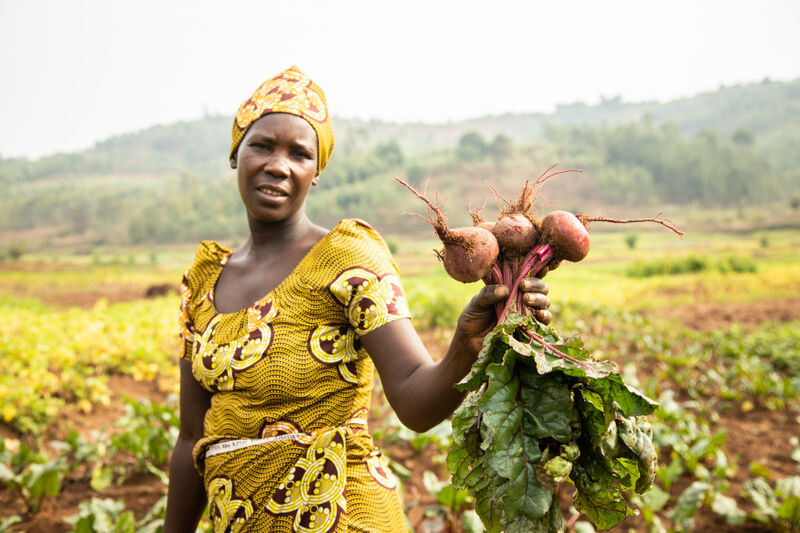
Joselyne, 44, harvests beetroots from her farm.
Coming Full-Circle
Having lived in an orphanage and been supported by organisations like those I now photograph for touches me on a deeply personal level. It feels like my work has come full circle. I know first-hand what it means to rely on the support of charities and non-profits, and now, through my photography, I can give back and help these same organisations tell their stories.
Every time I capture the resilience and strength of people who are benefiting from these programmes, I see a reflection of my own journey. It’s a constant reminder of where I came from and how far I’ve come, which makes the work more meaningful to me. It’s more than just a job – it’s a way of paying forward the support I received as a child, and that gives my work a profound sense of purpose.
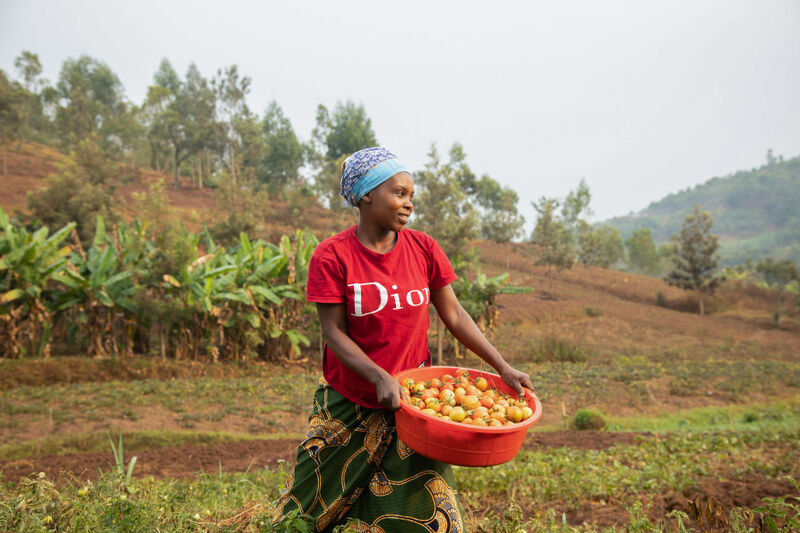
Felicia, 34, poses for a photograph holding a bucket of ripe tomatoes.
Advice for Future Photographers
For anyone thinking of embarking on a similar journey, my advice is simple: do your research and engage deeply with the community you’re documenting. Understanding the culture and building trust with your subjects is crucial. You’ll also need to be adaptable – logistical challenges like transportation and tough environments are par for the course. But most importantly, focus on storytelling. Your images should reflect both the struggles and triumphs of the people you photograph, ensuring their dignity and authenticity.
As a Rwandan photographer working internationally, I find immense pleasure and growth in this work. The cultural connection helps me engage more deeply with my subjects but navigating different expectations and logistical hurdles pushes me to continuously evolve. And that, in the end, is what makes each assignment so rewarding.
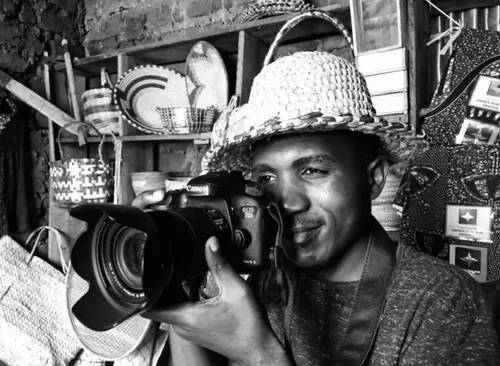
Photography means the world to Mussa.